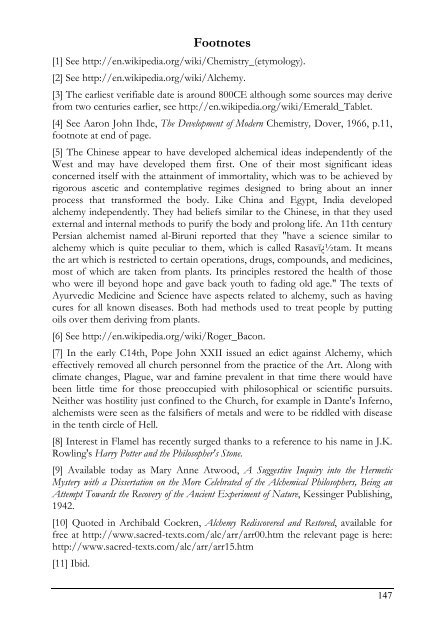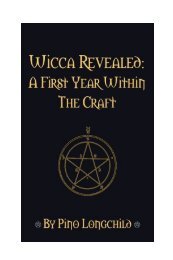A Magickal Herball Compleat.pdf - Magicka School
A Magickal Herball Compleat.pdf - Magicka School
A Magickal Herball Compleat.pdf - Magicka School
Create successful ePaper yourself
Turn your PDF publications into a flip-book with our unique Google optimized e-Paper software.
Footnotes<br />
[1] See http://en.wikipedia.org/wiki/Chemistry_(etymology).<br />
[2] See http://en.wikipedia.org/wiki/Alchemy.<br />
[3] The earliest verifiable date is around 800CE although some sources may derive<br />
from two centuries earlier, see http://en.wikipedia.org/wiki/Emerald_Tablet.<br />
[4] See Aaron John Ihde, The Development of Modern Chemistry, Dover, 1966, p.11,<br />
footnote at end of page.<br />
[5] The Chinese appear to have developed alchemical ideas independently of the<br />
West and may have developed them first. One of their most significant ideas<br />
concerned itself with the attainment of immortality, which was to be achieved by<br />
rigorous ascetic and contemplative regimes designed to bring about an inner<br />
process that transformed the body. Like China and Egypt, India developed<br />
alchemy independently. They had beliefs similar to the Chinese, in that they used<br />
external and internal methods to purify the body and prolong life. An 11th century<br />
Persian alchemist named al-Biruni reported that they "have a science similar to<br />
alchemy which is quite peculiar to them, which is called Rasav�tam. It means<br />
the art which is restricted to certain operations, drugs, compounds, and medicines,<br />
most of which are taken from plants. Its principles restored the health of those<br />
who were ill beyond hope and gave back youth to fading old age." The texts of<br />
Ayurvedic Medicine and Science have aspects related to alchemy, such as having<br />
cures for all known diseases. Both had methods used to treat people by putting<br />
oils over them deriving from plants.<br />
[6] See http://en.wikipedia.org/wiki/Roger_Bacon.<br />
[7] In the early C14th, Pope John XXII issued an edict against Alchemy, which<br />
effectively removed all church personnel from the practice of the Art. Along with<br />
climate changes, Plague, war and famine prevalent in that time there would have<br />
been little time for those preoccupied with philosophical or scientific pursuits.<br />
Neither was hostility just confined to the Church, for example in Dante's Inferno,<br />
alchemists were seen as the falsifiers of metals and were to be riddled with disease<br />
in the tenth circle of Hell.<br />
[8] Interest in Flamel has recently surged thanks to a reference to his name in J.K.<br />
Rowling's Harry Potter and the Philosopher's Stone.<br />
[9] Available today as Mary Anne Atwood, A Suggestive Inquiry into the Hermetic<br />
Mystery with a Dissertation on the More Celebrated of the Alchemical Philosophers, Being an<br />
Attempt Towards the Recovery of the Ancient Experiment of Nature, Kessinger Publishing,<br />
1942.<br />
[10] Quoted in Archibald Cockren, Alchemy Rediscovered and Restored, available for<br />
free at http://www.sacred-texts.com/alc/arr/arr00.htm the relevant page is here:<br />
http://www.sacred-texts.com/alc/arr/arr15.htm<br />
[11] Ibid.<br />
147




